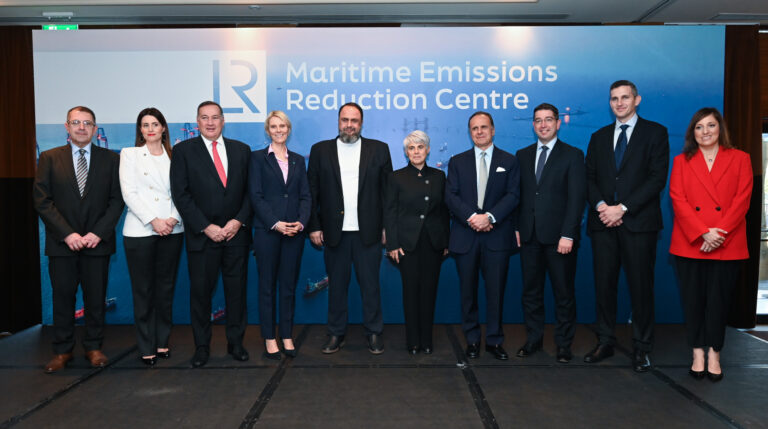The Lloyd’s Register (LR) Maritime Decarbonisation Hub is collaborating with five shipowners to establish a not-for-profit Athens-based global Maritime Emissions Reduction Centre (M-ERC) that will focus on optimizing the efficiency of the existing fleet.
The M-ERC is being created with the goal of removing technical, investment and community barriers for the uptake of solutions to reduce the greenhouse gas (GHG) emissions of the existing global fleet, offering a collaborative ‘safe space’ for the maritime value chain’s stakeholders, to safely navigate to net zero.
To inform and inspire the adoption of new and existing solutions to facilitate the maritime energy transition, the center will use its applied research to remove uncertainties and barriers, enabling the uptake of technologies and solutions today. The M-ERC will help drive optimal operational gains, identifying and resolving the commercial obstacles that stakeholders face.
The center is also intended to play an important role in ensuring that today’s ships are suitable for the energy transition while ensuring that the people within the industry have the necessary training and skills. These goals are to be achieved through research and collaboration with shipyards and original equipment manufacturers (OEMs) alongside the M-ERC’s work across society, ports and seafarer organizations to ensure upskilling and awareness among seafarers and shore-based staff.
As part of the collaboration between the LR Maritime Decarbonisation Hub and shipowners, including Capital Group, Navios Maritime Partners, Neda Maritime Agency, Star Bulk and Thenamaris, the center will aim to attract global and regional funding to fund activities, projects and initiatives to deliver on the desired outcomes of the M-ERC. It is anticipated that more shipping stakeholders will join the initiative in the months to come.
Nick Brown, CEO of Lloyd’s Register, said, “While there is much uncertainty on future fuels, the one clarity is that the less fuel [that’s] used [will] benefit us today and beyond 2050. We need to explore every possible efficiency gain from the current fleet. Energy-saving technologies and operational practices will play the primary role in delivering the 30% reduction of emissions targeted by the IMO in just six years’ time. So, we need to make every upcoming drydocking count and the Maritime Emissions Reduction Centre in Athens will support our industry to evaluate and implement existing and new solutions.”
Evangelos Marinakis, chairman and founder of Capital Maritime & Trading Corp, said, “Energy transition in the shipping industry is a challenge that necessitates collective forces. Maritime Emissions Reduction Centre is the implementation act of this initiative, and it is our duty to participate in this first movers’ alliance, an international decarbonization maritime hub, where knowledge, skills, innovation and research are shared. Its goal is to collaboratively work toward achieving a feasible, safe and sustainable decarbonization pathway for the maritime fleet.”
Angeliki Frangou, chairwoman of the board and CEO of Navios Maritime Partners LP, said, “Navios believes in the fundamental importance of developing appropriate technologies and solutions for reducing carbon emissions. As responsible members of the global community, we continue to investigate novel approaches for solving this complex problem. Participating in the establishment of the global Maritime Emissions Reduction Centre is another example of our commitment to this effort.”
George Thanopoulos, CEO of Neda Maritime Agency, commented, “We believe that the establishment of the M-ERC in Athens will significantly enhance the shipping industry’s efforts toward a sustainable future. We are delighted to collaborate with LRS and leading shipowners, to pave the way for the introduction and evaluation of environmentally friendly, safe and innovative technological solutions with an emphasis on the existing fleet.”
“At Star Bulk, we are excited to collaborate with our Greek shipping colleagues and Lloyd’s Register in founding the Maritime Emissions Reduction Centre,” added Charis Plakantonaki, chief strategy officer of Star Bulk Carriers Corporation. “This initiative reflects our shared commitment to driving sustainable change and underscores the role of Athens as a global maritime hub. By leveraging Greece’s shipping heritage and expertise, we are able to take steps today to improve the energy efficiency of the world fleet and to reduce the carbon footprint of our industry.”
Nikolas Martinos, CEO of Thenamaris, said, “We firmly believe in the power of collaboration to accelerate the decarbonization of the maritime industry. There is a pressing need to identify and implement safe and practical solutions as we transition to the fuels and technologies of the future. As a founding member of the Maritime Emissions Reduction Centre, Thenamaris is committed to being an active partner in this initiative.”
For more key vessel design updates from the electric and hybrid marine technology industry, click here



